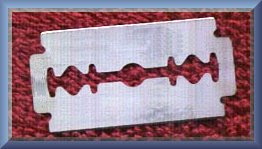


Terwyl ons nou op die toppic van hande is.......
FREAKEN NICE SONG.... VAN JEWEL


But they're not yours, they are my own










He cries in the corner where nobody sees. He’s the kid with the story no one would believe. He prays every night, “Dear God won’t you please Could you send someone here who will love me?”Who will love me for me.
Not for what I have done or what I will become. Who will love me for me‘Cause nobody has shown me what love. What love really means.
Her office is shrinking a little each day. She’s the woman whose husband has run away. She’ll go to the gym after working today. Maybe if she was thinner. Then he would’ve stayed. And she says…Who will love me for me? Not for what I have done or what I will become. Who will love me for me?‘Cause nobody has shown me what love, what love really means.
He’s waiting to die as he sits all alone. He’s a man in a cell who regrets what he’s done. He utters a cry from the depths of his soul“Oh Lord, forgive me, I want to go home”
Then he heard a voice somewhere deep insideAnd it said “I know you’ve murdered and I know you’ve liedI have watched you suffer all of your life And now that you’ll listen, I’ll tell you that I...”I will love you for youNot for what you have done or what you will becomeI will love you for youI will give you the love The love that you never knew
JJ HELLER

MAKE BELIEVE
You said you couldn't keep me when you were seventeen . Too young to be a father. You kissed my hand and took your leave. And you taught me how to make believe. Make believe I was a gift to you from heaven. Make believe that you would take me as your own. Make believe that you would set the mark of what a man should be. You taught me how to make believe. And now that I've grown older.. I long for us to meet. I have a million questions. But most of all I want to see If all of it was make believe. Another year has come and gone. I am living with your family. And I feel right at home In the place where I always wanted to be. I'm going out this evening.
I check the mirror twice. You stop me on the staircase.You kiss my hand and say that I look beautiful tonight. And I believe I was a gift to you from heaven. And I believe that you would take me as your own. I believe that you set the mark of what a man should be. Now I don't have to make believe! -JJ HELLER-
HIERDIE SONG IS DEDICATTED AAN MY PAPPA....EK LOVE JOU ZILJOEN!
THANK YOU
For painted purple skies
For never telling lies
For giving all you had away
For crying when I cry
Thank you...
For changing autumn leaves
The salty ocean breeze
For coming down from heaven to save a wretch like me
Thank you...
I can't understand why you left your throne
But I know that you came and you saved my soul...
Amazing grace How sweet the sound
I once was lost,
but now I'm found
Ooh, thank you!!!!!!!!
-JJ HELLER-



Testosterone
Ego..focus..compettitive..winning..achiever..build house..security
Praise for winning
 Love, warmth and light
Love, warmth and light

Psychological motivations:What self-injurers say SI does for themMany papers on self-harm
Escape from emptiness, depression, and feelings of unreality.
Easing tension.
Providing relief: when intense feelings build, self-injurers are overwhelmed and unable to cope. By causing pain, they reduce the level of emotional and physiological arousal to a bearable one.
Relieving anger: many self-injurers have enormous amounts of rage within. Afraid to express it outwardly, they injure themselves as a way of venting these feelings.
Maintaining a sense of security or feeling of uniqueness
Expressing emotional pain they feel they cannot bear
Obtaining or maintaining influence over the behavior of others
Communicating to others the extent of their inner turmoil
Communicating a need for support
Expressing or repressing sexuality
Validating their emotional pain -- the wounds can serve as evidence that those feelings are real
Obtaining biochemical relief: there is some thought that adults who were repeatedly traumatized as children have a hard time returning to a "normal" baseline level of arousal and are, in some sense, addicted to crisis behavior. Self-harm can perpetuate this kind of crisis state
Diverting attention (inner or outer) from issues that are too painful to examine
Exerting a sense of control over one's body
Affect regulation -- Trying to bring the body back to equilibrium in the face of turbulent or unsettling feelings. This includes reconnection with the body after a dissociative episode, calming of the body in times of high emotional and physiological arousal, validating the inner pain with an outer expression, and avoiding suicide because of unbearable feelings. In many ways, as Sutton says, self-harm is a "gift of survival." It can be the most integrative and self-preserving choice from a very limited field of options.
Communication -- Some people use self-harm as a way to express things they cannot speak. When the communication is directed at others, the SIB is often seen as manipulative. However, manipulation is usually an indirect attempt to get a need met; if a person learns that direct requests will be listened to and addressed the need for indirect attempts to influence behavior decreases. Thus, understanding what an act of self-harm is trying to communicate can be crucial to dealing with it in an effective and constructive way.
Control/punishment -- This category includes trauma reenactment, bargaining and magical thinking (if I hurt myself, then the bad thing I am fearing will be prevented), protecting other people, and self-control. Self-control overlaps somewhat with affect regulation; in fact, most of the reasons for self-harm listed above have an element of affect control in them.

An invalidating environment is one in which communication of private experiences is met by erratic, inappropriate, or extreme responses. In other words, the expression of private experiences is not validated; instead it is often punished and/or trivialized. the experience of painful emotions [is] disregarded.
The individual's interpretations of her own behavior, including the experience of the intents and motivations of the behavior, are dismissed...
Invalidation has two primary characteristics.
First, it tells the individual that she is wrong in both her description and her analyses of her own experiences, particularly in her views of what is causing her own emotions, beliefs, and actions.
Second, it attributes her experiences to socially unacceptable characteristics or personality traits.This invalidation can take many forms:
"You say no but you mean yes, i know."
"You're being hypersensitive."
"You're just lazy."
"I won't let you manipulate me like that."
"Cheer up. Snap out of it. You can get over this."
"If you'd just look on the bright side and stop being a pessimist..."
"You're just not trying hard enough."
"I'll give you something to cry about!"
Everyone experiences invalidations like these at some time or another, but for people brought up in invalidating environments, these messages are constantly received. Parents may mean well but be too uncomfortable with negative emotion to allow their children to express it, and the result is unintentional invalidation. Chronic invalidation can lead to almost subconscious self-invalidation and self-distrust, and to the "I never mattered" feelings



In my onvermoẻ om nie aan jou te dink nie,
probeer ek sin maak van my wereld en die prominente rol wat jy daarin speel.
Wind waai die gedagtes,die gedigte wat oor jou gaan deurmekaar.
Blare ritsel en trek die haarfyn toutjies van my hart tot op n punt... Die punt waar dit net-net wil breek.
Wolke se trane bliksem neer vanuit die lug en vorm sulke plassies,
waarin ek die herrinnering van jou gesig probeer verdrink.
Weereens probeer ek sin maak van my en die wereld waarin ek myself bevind.